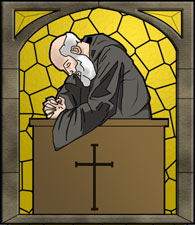Feast of the Triumph of the Cross
 Today's Eucharistic service included the first profession of vows by Brothers Peter and Peregrine. The monks processed in from the narthex, through the nave, and up into the choir--following the uplifted cross and with censers wafting the sweet smell of incense. There was a curious juxtaposition with the familiar Protestant hymn, first penned by the Victorian, George Kitchin. "Lift high the cross," we sang, "the love of Christ proclaim, till all the world adore his sacred name."
Today's Eucharistic service included the first profession of vows by Brothers Peter and Peregrine. The monks processed in from the narthex, through the nave, and up into the choir--following the uplifted cross and with censers wafting the sweet smell of incense. There was a curious juxtaposition with the familiar Protestant hymn, first penned by the Victorian, George Kitchin. "Lift high the cross," we sang, "the love of Christ proclaim, till all the world adore his sacred name."I was privileged to be in something of the catbird's seat on the east side of the choir within a few feet of Abbot John. His homily was deeply stirring. The free embrace of limits, he said, is not constraining but, instead, brings to us true freedom. Sounding like any good Evangelical preacher (outside of the fact that he had written out his sermon--oh, my!), he challenged his hearers to remember that the Scriptures call us to orient ourselves to the gospel. His tall stature and large hands reached out to the crowd in the choir and implored us to see what these two young men were doing as, ultimately, freeing.
I couldn't help thinking how "counter-cultural" this experience was for me, a good Protestant boy, and yet how compelling a gospel message and selfless act we were all witnessing. What has happened to those of us who consider ourselves Evangelicals that we are so anxious to conform to the culture (to be considered, in the words of Randall Balmer, "winners") that we forget that the challenge is to allow our lives to be shaped by the gospel, not to sell the gospel out in order to give people what they want to hear? It hit me for the first time that, just as my wife and I renew our marriage vows whenever we listen to another couple say those words we first uttered to one another almost three decades ago, the fully-professed monks were clearly remembering, on this occasion, their own vows on that day (for some) so long ago.
Abbot John also turned somewhat "Mannoian," launching his homily by suggesting that what we were all witnessing on this day was the greatest example of paradox the world has ever known. As the apostle Paul claims in 1 Corinthians 1, the worst instrument of Roman torture has become the most powerful sign of reconciliation. While it wasn't quite as sobering as watching monastics take their final vows, the memories of this day will long linger and challenge me to ask, "Have I made the cross the center of my existence?" Perhaps this is what Helena, the mother of the Emperor Constantine, really hoped to accomplish when she had the Church of the Holy Sepulchre constructed in the fourth century (in whose honor we celebrate this day). What does it ultimately mean for us to live out our lives in the shadow of the cross of Christ?


<< Home